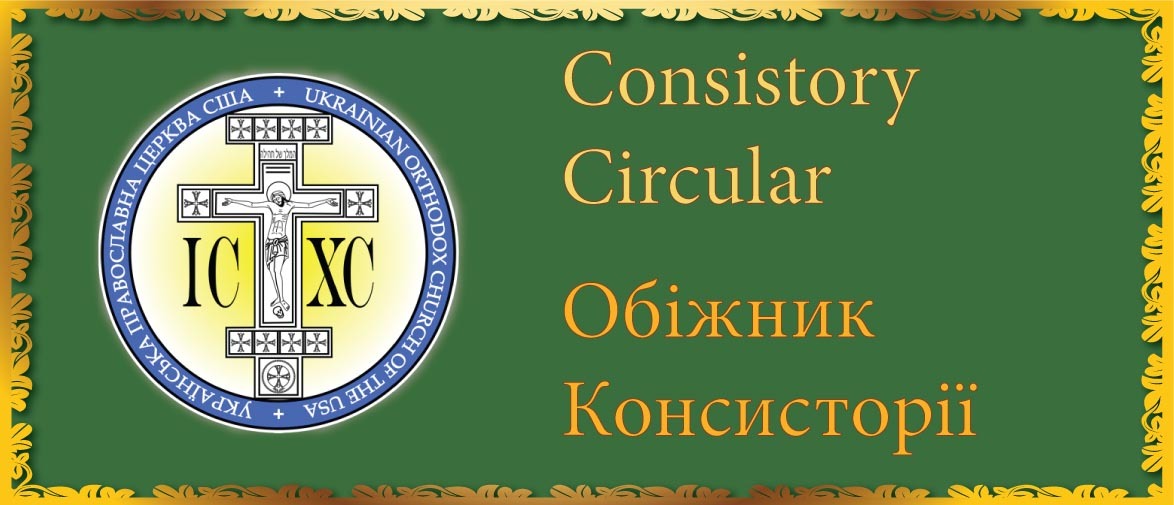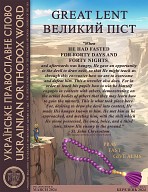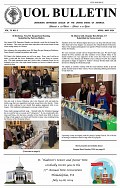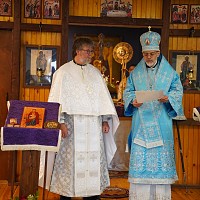In my opinion this is one of the most wonderful Sundays of the year. The book known as the Triodion is used today for the first time as we approach Great and Holy Lent – the time when we begin to prepare ourselves for the annual season of fasting arid repentance. Hopefully we have grown spiritually during the past year and we have attained a deeper understanding of what a wondrous thing repentance truly is. Repentance is not a dark and gloomy pursuit – the process is joyous, exciting and awe-inspiring as we heal, transform and elevate our minds and souls.
The idea of repenting is frightening to many – we know that things aren't right within ourselves and we are slow to fully admit because we fear that God won't accept us because of these maladies. We call this spiritual despair Shame.
The 13th-century Persian Rumi wrote: "The water said to the dirty one, 'Come here.' The dirty one said, 'I am too ashamed.' The water replied, 'How will your shame be washed away without me?"
To further illustrate the point: imagine for a moment standing at the edge of the pool on a hot day in August. All you have to do is jump into the water to be refreshed. It's really quite simple: stand on the edge of the pool, hold your breath, plug your nose and then let gravity do the rest. But now imagine that you are standing at the edge of the same pool, without your bathing suit or any clothes at all – completely naked for the world to see. It's suddenly not so easy, is it? Most of us would be so paralyzed by the shame of our impending humiliation that we wouldn't be able to jump in the water or even get close to the pool. That shame that we feel about our spiritual inadequacies has the same paralyzing effect on our ability to truly repent.
Take a moment to reflect back to our childhood days, spending endless hours playing with our siblings and friends. How many times did we trip and fall, scraping our knees and then running to a parent for help with tears in our eyes. Our parents did the same thing every time: first gently cleaning the wound with a wet cloth and soap. When the wound was free of dirt and fully visible, our parents would choose the next step of treatment – either some ointment for a superficial wound or a visit to the doctor for stitches. That dirt that covers our wounds is shame – and it prevents us from getting the necessary treatment in order to properly heal. If we let go of our fears and commit ourselves to receiving spiritual treatment, God will be the one to take the wet cloth and gently clean our wound from the shame that prevents treatment.
The Pharisee in today's Gospel narrative had wounds that were left dirty and untreated for so long that they became infected. The infection was manifested in his arrogance, conceit and judgement of others. The Pharisee used his position of power to hide the wounds and refuse treatment.
In addition to being an affliction that needs to be remedied, wounds are also a place where light shines through – providing clarity and a greater understanding. Wounds on our spiritual bodies are the cracks in the wall of Ego. Were it not for these wounds, the Light of God wouldn't be able to shine through.
Many of us, myself included, have a great interest and enthusiasm for sports. We are bombarded by stories in the media about athletes suffering debilitating injuries, oftentimes in the prime of their careers. Judging by their reactions in various interviews and soundbites, it is the first brush with mortality for many of them. Athletes are conditioned from an early age to play their game with maximum intensity and reckless abandon for their physical condition. Athletes are more focused on the minute to minute battles of the sport than their own health – and so imagine the shock when their machine breaks down for the first time. The ego is hurt more than any structural injury, and the once invincible is rendered powerless. But, remember: these wounds let the light shine in and illustrate why we are not so great as the Pharisee thinks he is. Athletes who rehabilitated themselves come back from injuries more focused on maintaining their wellness and have a better understanding of their limitations.
So we need to take stock of our wounds in order to address them. The first awareness of a malady is the recognition of a negative behavior and the uneasiness that we feel while reflecting upon it. The source of this unease is the acknowledgement of a gap between who we are currently and who we would like to be. This is a frightful realization – it means that we haven't succeeded on our own and need help. When the feeling of uneasiness grows alongside the desire for change something wonderful happens – we discover Compassion. Those who show compassion to themselves only then are ready to open themselves to receive the compassion of the Almighty.
When our wounds are completely cleaned and ready to be treated, we can finally approach the Physician of Souls and hear him say "I accept you – don't be afraid. I am here for you and I will take care of you." A great burden is lifted from our shoulders and the healing process begins.
If we need any more reminders that God's attitude of Radical Acceptance towards humanity, then take a moment to look around the church and reflect on the image of Christ on the Life-Giving Cross. As we begin to prepare ourselves for Great and Holy Lent, remember that Christ's death the ultimate sign that God is saying to each of us: "I accept you – don't be afraid. I am here for you and I will take care of you." What kind of all-loving God would He be if he didn't accept us as we are?
V. Rev. Myron Oryhon
|
| |||||||||||












